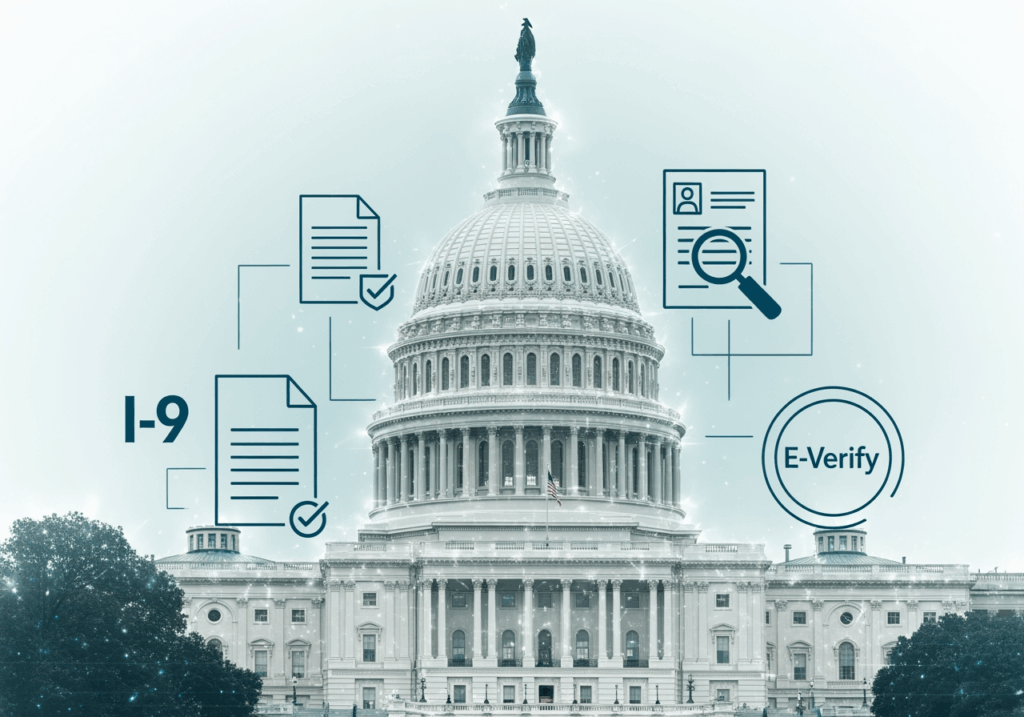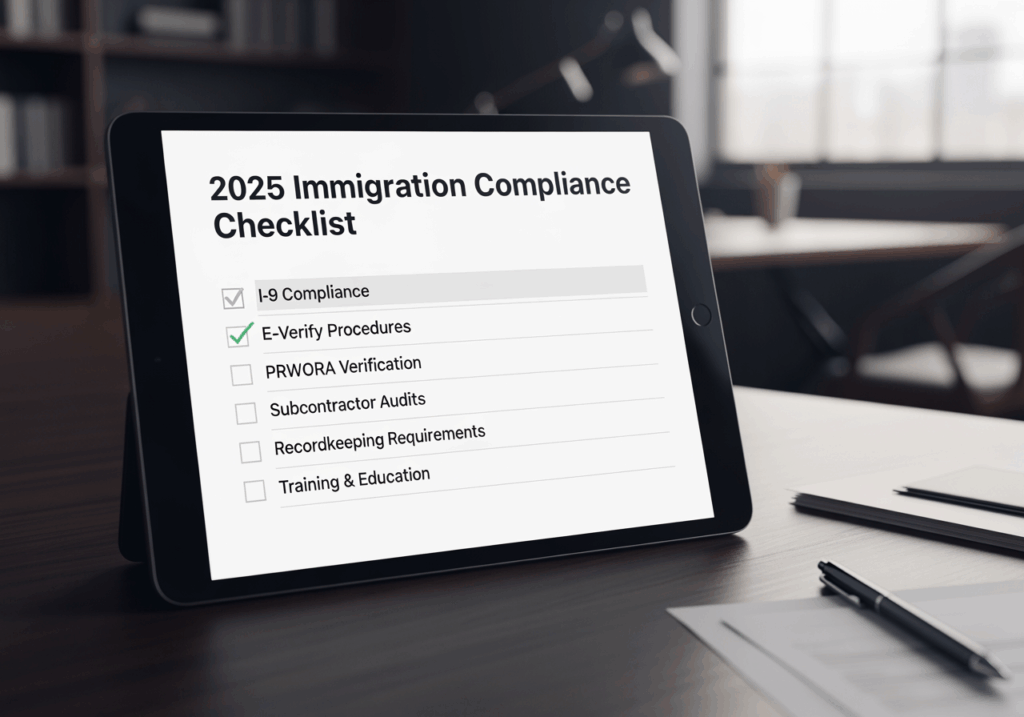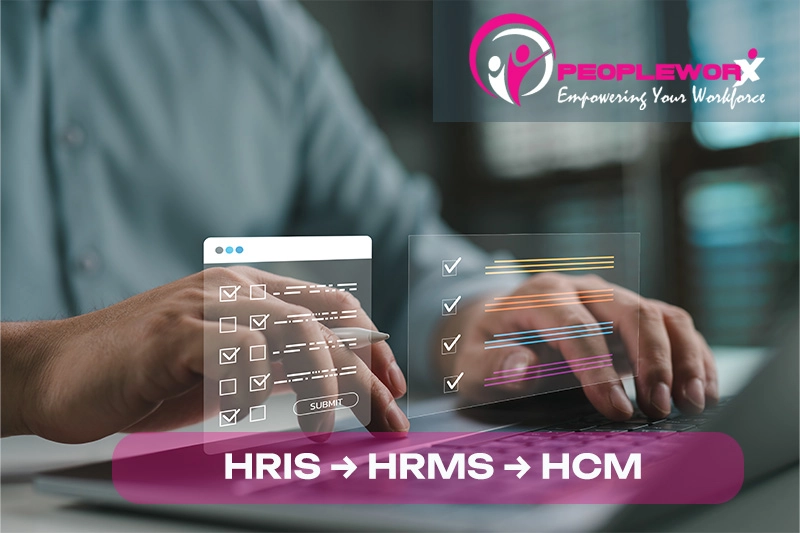The Trump administration’s expanded use of the False Claims Act (FCA) is reshaping immigration-related compliance. Here’s what employers must understand, and how to stay ahead.
Content
- A New Enforcement Era: The FCA Moves Beyond Traditional Fraud
- Why Small and Mid-Sized Organizations Should Pay Attention
- The 2025 Immigration Compliance & FCA Risk Checklist
- How PeopleWorX Helps Organizations Navigate Increasing Compliance Pressure
- Ready to Review Your I-9, E-Verify, or Federal Grant Documentation?
- Frequently Asked Questions (FAQs)

A New Enforcement Era: The FCA Moves Beyond Traditional Fraud
In 2025, the federal government is using the False Claims Act (FCA) in a new way, one that directly impacts how small and mid-sized organizations manage hiring, workforce documentation, and federal funding.
Traditionally, the FCA focused on financial fraud, billing abuses, or misrepresentation. However, recent guidance shows a major shift: the FCA is now an immigration-compliance enforcement tool.
This change is especially relevant for organizations that receive any form of federal funds, including:
- Federal contractors and subcontractors
- Nonprofits receiving federal grants
- Healthcare organizations tied to Medicare and Medicaid
- Local governments and program administrators
- Small businesses participating in federal programs
This new approach extends FCA liability into areas such as:
- E-Verify compliance for federal contractors
- Employment authorization verification connected to public benefits
- PRWORA-related eligibility determinations
- Certifications and attestations tied to grants and awards
- Accuracy of HR, payroll, and onboarding documentation
A recent multimillion-dollar settlement involving I-9 and eligibility errors confirms the direction: immigration compliance is now an FCA priority.

Why Small and Mid-Sized Organizations Should Pay Attention
For SMBs, nonprofits, and government contractors, this shift expands the types of mistakes that can trigger FCA investigations.
And importantly, intent no longer matters.
Operational inconsistency can be enough to create risk.
Common exposure points now include:
- Incorrect, incomplete, or inconsistent I-9s
- Misuse of E-Verify by hiring managers
- Subcontractors failing to follow verification rules
- Misinterpreting federal grant or contract requirements
- Mistakes in PRWORA eligibility determinations
- Compliance certifications that don’t align with HR or payroll data
- Disconnected workflows between HR, payroll, and grant administration
Most employers aren’t acting maliciously, the issue is complexity.
This is where PeopleWorX focuses: helping employers build people-operations systems that support compliance while protecting employee experience.

The 2025 Immigration Compliance & FCA Risk Checklist
Practical steps SMBs, nonprofits, and contractors can use immediately.
1. Employment Verification Practices (I-9 and E-Verify)
- Ensure all new-hire I-9s are accurate and audit-ready
- Use E-Verify correctly when required by contract
- Train hiring managers on lawful hiring inquiry boundaries
- Complete at least one internal I-9 audit per year
- Document your verification procedures in writing
- Verify subcontractor compliance before onboarding them
PeopleWorX Tip:
A centralized onboarding system prevents inconsistent documentation across locations and managers.
2. Federal Grant and Contract Certifications
- Review immigration-related terms in each award
- Verify certification accuracy against HR/payroll data
- Track deadlines to avoid rushed submissions
- Maintain communication between HR, payroll, and grant teams
PeopleWorX Tip:
A single-database HR + payroll system eliminates errors created by manual reconciliation.
3. PRWORA Eligibility Rules
- Identify all programs requiring immigration-status verification
- Train staff who manage eligibility or documentation
- Use only approved federal documentation, not assumptions
Leverage technology to remove manual errors
4. Subcontractor and Vendor Oversight
- Require written compliance attestations
- Maintain documentation of subcontractor verification practices
- Include immigration standards in all vendor agreements
- Conduct periodic spot checks and audits
5. Recordkeeping and Documentation
- Store I-9 and E-Verify records separately from personnel files
- Follow federal retention requirements
- Use a centralized HR or payroll system for consistency
- Prepare for whistleblower review, documentation matters
6. People Strategy Integration
- Train supervisors to avoid discrimination in hiring
- Ensure DEI principles guide verification processes
- Maintain clear, transparent communication with employees
- Use onboarding automation to reduce human error.

How PeopleWorX Helps Organizations Navigate Increasing Compliance Pressure
As compliance obligations expand, the risk of honest mistakes grows. PeopleWorX helps small businesses, nonprofits, and contractors stay ahead with:
Technology + Human Support
- Adaptive onboarding and employment-eligibility verification
- Payroll and HR systems that keep data consistent and audit-ready
- Workforce tools built to integrate HR, payroll, and compliance
Dedicated Support (Never a Call Center)
Every PeopleWorX client receives a dedicated representative, someone who understands your business, anticipates challenges, and supports you during audits or documentation reviews
HR Consulting That Keeps People at the Center
We combine regulatory alignment with a “People Matter” philosophy. Compliance should protect people, not overwhelm them.

Ready to Review Your I-9, E-Verify, or Federal Grant Documentation?
Whether you need a full audit of your processes or want to modernize your onboarding and verification systems, PeopleWorX can help at any stage.
Frequently Asked Questions (FAQs)
What is the False Claims Act and how does it relate to immigration compliance in 2025?
The FCA historically targeted financial fraud, but in 2025 the federal government is using it to enforce immigration-related requirements like I-9 accuracy, E-Verify, and PRWORA eligibility determinations, especially for employers receiving federal funds.
Can small businesses be held liable for immigration errors under the FCA?
Yes. Any organization that receives or administers federal funds can face FCA scrutiny, even if compliance mistakes are unintentional.
Are nonprofits and grant recipients affected by this shift?
Absolutely. Nonprofits receiving federal grants are now considered high-priority for FCA enforcement tied to documentation, eligibility verification, and compliance certifications.
How can employers reduce FCA-related immigration risks?
Employers should conduct annual I-9 audits, maintain consistent documentation across HR and payroll, train managers, verify subcontractor compliance, and centralize onboarding processes.
How does PeopleWorX support FCA-related compliance requirements?
PeopleWorX provides onboarding automation, I-9/E-Verify documentation tools, HR consulting, payroll integration, and dedicated support to help employers stay aligned with federal expectations.






